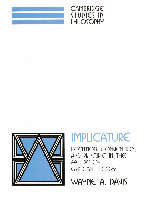5 - The existence of implicature conventions
Published online by Cambridge University Press: 20 March 2010
Summary
According to Grice's Razor, it is more economical to postulate conversational implicatures than senses, conventional implicatures, or semantic presuppositions. For conversational implicatures can be derived from general psychosocial principles, whereas things like senses require specific linguistic conventions. We have seen that the first premise here must be rejected. Conversational implicatures cannot be derived from the Cooperative Principle, the Maxims of Quantity, Quality, Relation, and Manner, or the Principles of Style, Politeness, or Efficiency. This holds for both sentence implicatures and speaker implicatures.
The evidence we have reviewed also suffices to show that in addition to the conventions assigning meanings and presuppositions to particular words and sentences, there are many conversational implicature conventions, conventional ways of conversationally implicating things. Because a complete explanation of the data involving conversational implicatures requires the postulation of implicature conventions, the theoretical complexity introduced by the postulation of conversational implicatures is of the same order of magnitude as that introduced by senses or conventional implicatures.
The claim that certain conversational implicatures are conventional has at least the air of self-contradiction. For Grice used the term conventional implicature to denote a class of implicatures distinct from the conversational. When Sadock gives Grice's six characteristics of conversational implicatures, he writes,
Conversational implicata are not part of the meaning of the uttered forms.They are NONCONVENTIONAL. (Sadock 1978:284)
We will see that being conventional does not entail being part of the meaning of implicature-bearing sentences, and that the distinction Grice marked with the terms “conversational” and “conventional” is valid even though convention is involved in both.
- Type
- Chapter
- Information
- ImplicatureIntention, Convention, and Principle in the Failure of Gricean Theory, pp. 132 - 154Publisher: Cambridge University PressPrint publication year: 1998



